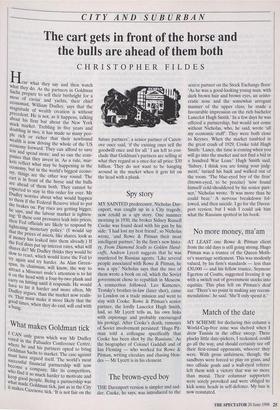The brown-eyed boy
THE Davenport version is simpler and sad- der. Cooke, he says, was introduced to the senior partner on the Stock Exchange floor: `As he was a good-looking young man, with dark brown hair and brown eyes, an aristo- cratic nose and the somewhat arrogant manner of the upper class, he made a favourable impression on the rich bachelor Lancelot Hugh Smith.' In a few days he was offered a partnership, but would not come without Nicholas, who, he said, wrote 'all my economic stuff. They were both close to Keynes. When the market tumbled in the great crash of 1929, Cooke told Hugh Smith: Taney, the time is coming when you will go into the market and not find a bid in a hundred War Loan.' Hugh Smith said, `Sidney, I think you are losing your judg- ment,' turned his back and walked out of the room. 'The blue-eyed boy of the firm' (brown-eyed, to be precise) 'now found himself cold-shouldered by his senior part- ner,' Nicholas wrote. 'It was more than he could bear.' A nervous breakdown fol- lowed, and then suicide. I go for the Daven- port version, but I wish I could ask him what the Russians spotted in his book.


























































 Previous page
Previous page